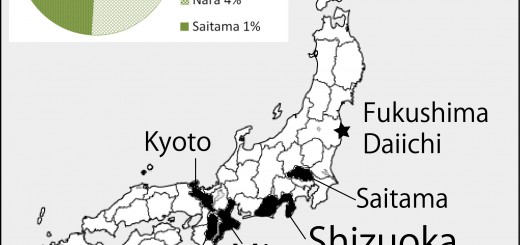Can there be a silver lining? Nuke Info Tokyo No. 141
Opinion Article published by Kyodo News, March 28, 2011
by CNIC International Liaison Officer, Philip White
The most remarkable thing about the response so far to the “gempatsu shinsai” (nuclear-earthquake disaster) that has engulfed Japan is that there are still people who think nuclear power has a future. Should this be attributed more to the dependence of modern industrialized societies on massive inputs of energy, or to a collective lack of imagination?
We do not yet know how this unfolding catastrophe will end, but we can be sure that if most of the radioactivity in the Fukushima Daichi Nuclear Power Plant remains on site, then the true believers will claim that this is as bad as it gets and that the risk is worth taking. The environmental damage of localized contamination and releases to sea will be discounted and long-term health impacts from exposure to low levels of radiation will be denied. Even those workers who suffer from acute radiation sickness will not find their way into the most commonly quoted statistics, unless they die promptly.
The truth is that even in the best-case scenario the environmental and human consequences of this disaster will be enormous. The potential impact of a worst-case scenario is beyond most people’s comprehension. To give an indication of the amount of radioactive material involved, the total capacity of the three reactors that were operating at the time of the earthquake was double that of the Chernobyl number 4 reactor that exploded 25 years ago in the Ukraine. To this you have to add the radioactivity in the spent fuel pools of all 6 units and of the shared spent fuel pool.
All of this is at risk and, due to the long-term heat generating properties of the fuel, the situation will not be stabilized any time soon. Even if the radioactivity does not travel far, the release of just a fraction would have incalculable consequences for human beings and the environment.
Besides the true believers, there are also those who regard nuclear energy as a necessary evil. They don’t particularly like it, but they see no alternative. But is it true that there is no alternative? For those who can’t see beyond the current centralized, supply-driven electricity power systems and who assume an eternally increasing demand for energy, then perhaps it is difficult to imagine how modern societies could survive without nuclear power. But if you allow the possibility of decentralized systems that reward the efficient provision of energy services, rather than the supply of raw energy, then hitherto unimagined options open up.
After last year’s oil spill in the Gulf of Mexico and now the Fukushima Daiichi “gempatsu shinsai”, people must realize that business as usual is not an option.
To claim that nuclear energy has a future represents a colossal failure of our collective imagination – a failure to imagine the risks involved and a failure to imagine how we could do things differently. If future generations are to say that there was a silver lining to the cloud of the Fukushima Daiichi disaster, it will be because human beings now looked beyond their recent history and chose to build a society that was not subject to catastrophic risks of human making.

